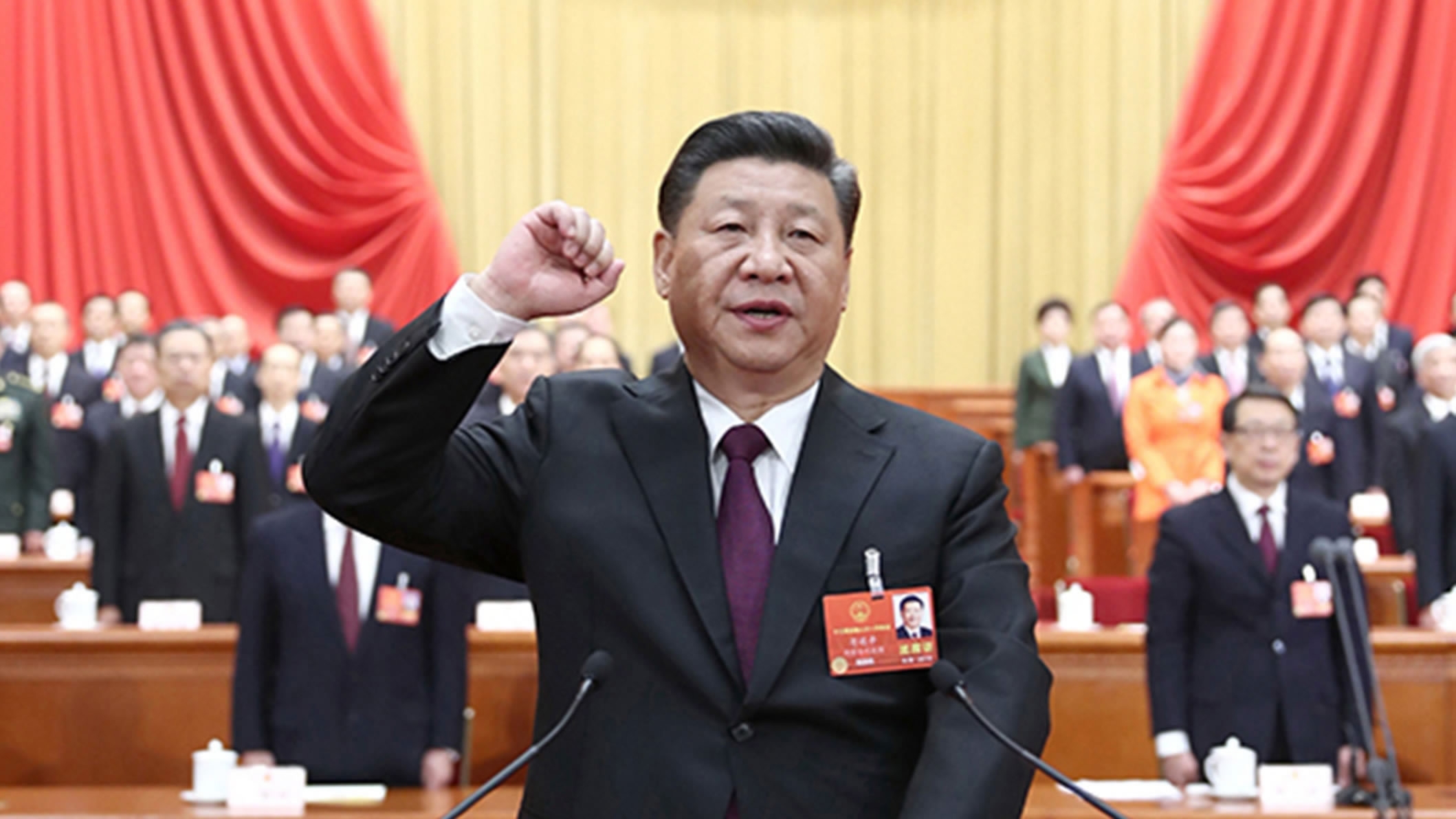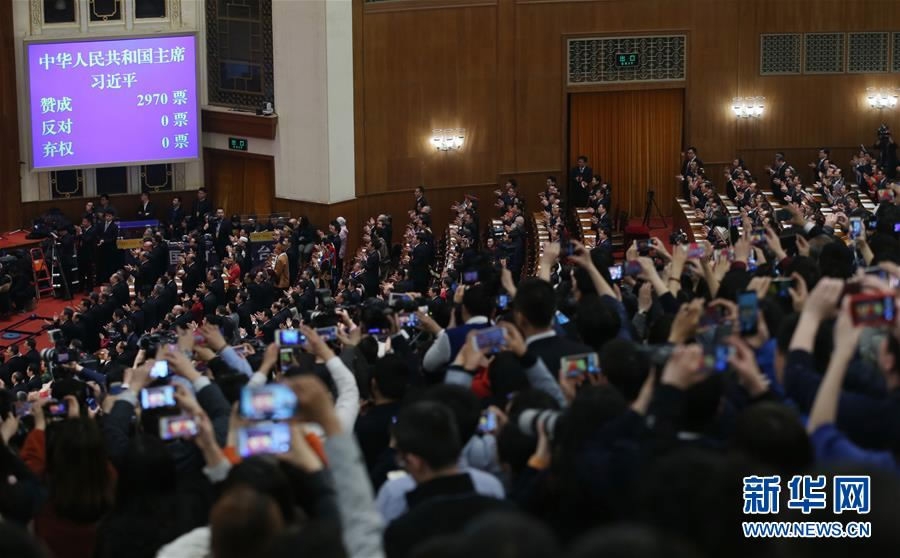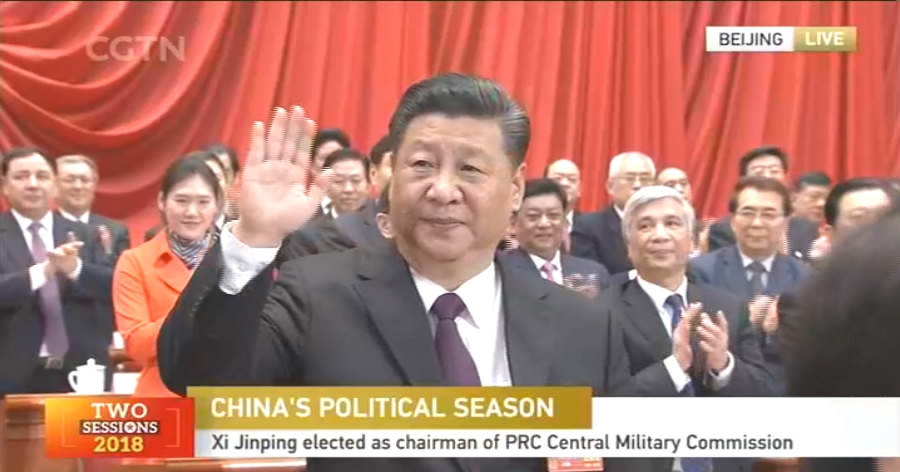
Politics
10:42, 17-Mar-2018
Xi Jinping elected Chinese president at NPC session
CGTN

Xi Jinping was elected Chinese president and chairman of the Central Military Commission of the People's Republic of China on Saturday morning at the ongoing session of the 13th National People's Congress (NPC).
"I pledge my allegiance to the Constitution of the People's Republic of China (PRC) to safeguard the Constitution authority, fulfill my legal obligations ..." said President Xi as he took the solemn oath in Beijing, marking the beginning of his second term.
"[I pledge to] be loyal to the country and the people, be committed and honest in my duty, accept the people's supervision and work for a great modern socialist country that is prosperous, strong, democratic, culturally advanced, harmonious, and beautiful," said the president.
Five years ago, at the fourth plenary meeting of the first session of the 12th NPC, he was elected president of the People's Republic of China (PRC) and chairman of the PRC Central Military Commission at the same place.
Born in 1953, Xi, who is from northwest China's Shaanxi Province, began his first job in January 1969 in Liangjiahe Brigade, Wen'anyi Commune, Yanchuan County, Shaanxi Province and joined the CPC in January 1974.

Xi Jinping is elected Chinese president and chairman of the Central Military Commission of the People's Republic of China at the fifth plenary meeting of the first session of the 13th National People's Congress (NPC) at the Great Hall of the People in Beijing, capital of China, March 17, 2018. /VCG Photo
Xi Jinping is elected Chinese president and chairman of the Central Military Commission of the People's Republic of China at the fifth plenary meeting of the first session of the 13th National People's Congress (NPC) at the Great Hall of the People in Beijing, capital of China, March 17, 2018. /VCG Photo
Xi graduated from the School of Humanities and Social Sciences at Tsinghua University where he completed an in-service graduate program in Marxist theory and ideological and political education. He holds a Doctor of Law degree.
Xi subsequently served during his regional political career in Hebei Province (1982–1985), Fujian Province (1985–2002), Zhejiang Province (2002–2007), and Shanghai (2007).
In 2007, he was elected a member of the Standing Committee of the Political Bureau of the CPC Central Committee and Secretariat of the CPC Central Committee as well as president of the Party School of the CPC Central Committee. Later, he was elected vice president of the People's Republic of China and vice chairman of the CPC Central Military Commission (CMC) and vice chairman of the PRC Central Military Commission.
After becoming general secretary of the CPC Central Committee at the First Plenary Session of the 18th CPC Central Committee in November 2012, Xi put forward, for the first time, the idea of the "Chinese Dream."
The great rejuvenation of the Chinese nation "is a dream of the whole nation, as well as of every individual," he said.
Holding the "Chinese Dream," Xi then made "historic change" happen in the ensuing 1,900-odd days.

CGTN screenshot
CGTN screenshot
A total of 360 major reform plans were put forward and over 1,500 reform measures launched, establishing a general framework for major changes and lending greater impetus to growth.
Hundreds of officials at or above provincial or corps level have been investigated for corruption and a campaign targeting undesirable working styles has ensured that the Party with over 89 million members stayed pure and grew stronger.
The two million-strong Chinese military has reshaped its way of thinking and work style, organizational form and armament.
The "strictest environmental protection system" was put in place and large numbers of officials were punished for insufficient work in this regard.
A proposal regarding a community with a shared future for mankind and the Belt and Road Initiative, proposed by Xi, were incorporated into UN documents.
At the sixth plenary session of the 18th CPC Central Committee in October 2016, the CPC called on all its members to "closely unite around the CPC Central Committee with Comrade Xi Jinping at the core."
Xi was re-elected general secretary of the Communist Party of China (CPC) Central Committee for a second term, a reflection of the will of the entire Party at the first plenary session of the 19th CPC Central Committee on October 25, 2017.
In his 32,000-character report to the 19th National Congress of the Communist Party of China, he said socialism with Chinese characteristics had crossed the threshold into a new era and proposed a two-step approach for China's future to becoming a "great modern socialist country."
"Xi Jinping Thought on Socialism with Chinese Characteristics for a New Era" was both written into the newly revised CPC Constitution and the Constitution of the People's Republic of China.
1km
Source(s): Xinhua News Agency

SITEMAP
Copyright © 2018 CGTN. Beijing ICP prepared NO.16065310-3
Copyright © 2018 CGTN. Beijing ICP prepared NO.16065310-3